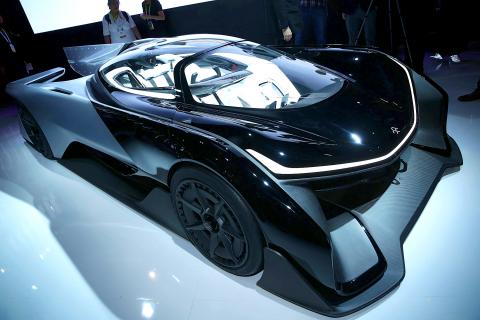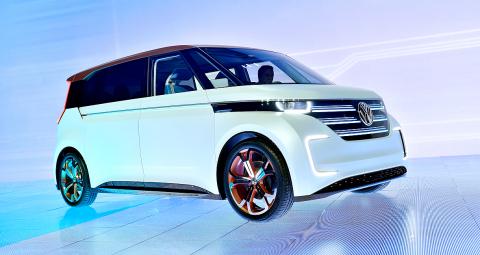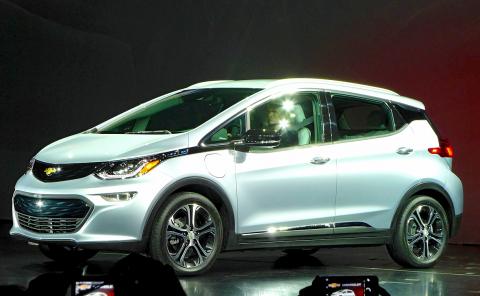Talk by automakers attending the Consumer Electronics Show (CES) this week in Vegas was nothing short of electric.
Ford Motor Co, General Motors Co (GM) and Volkswagen AG (VW) have made it clear they are betting on electric vehicles for the future, even though the segment is only a small sliver of the global industry.
Some of the vehicles unveiled at the Consumers Electronics Show have been concepts or prototypes, but GM displayed the final version of its Chevrolet Bolt, which aims to capture buyers who are interested in electric propulsion without the price tag of a Tesla.

Photo: AFP
However, the boldest statement came from California startup Faraday Future, which on Monday in Las Vegas unveiled its FFZERO1 concept car, resembling a Batmobile and touted as a game-changer in the industry.
The company, which has revealed little about its financial backing or management, has already said it would invest US$1 billion in a Nevada manufacturing plant and that it expects cars to be produced withing two years.
Volkswagen used CES to unveil its BUDD-e — a version of its hippie favorite Kombi minivan transformed into an electric, connected vehicle of the future.

Photo: AFP
The German automaker, hit by a global scandal over its diesel cars, said it expects the electric ones to be on the road by the end of the decade.
Ron Montoya of the auto research firm Edmunds.com said VW has a possible winner with the minibus.
“You can easily see that being a production car,” he said. “Not only would it be a very stylish car that a lot of people have emotional connections with, but it could be potentially one of the first [electric] minivans.”

Photo: AFP
In a move that could make electric cars affordable to a mass market, GM showed its definitive version of the Chevrolet Bolt and confirmed it would be in production later this year.
The Bolt is designed to travel 320km between charges, and it will cost less than US$30,000 after tax breaks, GM said.
It also features some of the connected technology found on rival vehicles, including a Wi-Fi hotspot offering access to apps and services.
“The Bolt EV [electric vehicle] is truly the first EV that cracks the code of long range and affordable price,” GM chief executive Mary Barra told a CES forum.
Meanwhile, Ford reaffirmed its plan to invest US$3.5 billion over the next five years in electric car development, with a goal of producing 13 new EV or hybrid vehicles by 2020.
Several other automakers are also committed to electric, and some see the segment gaining traction, even though electrics only represented 0.08 percent of the global auto fleet at the end of 2014.
There are signs consumers are warming to EVs. In Norway, for example, one out of every five cars registered last year was electric.
“EVs will play a bigger role in the automotive future — there’s little question about that,” Kelley Blue Book analyst Akshay Anand said. “The Bolt is a big step simply because of its price and range.”
However, Anand said there is still some reluctance.
Lower fuel prices have reduced the sense of urgency and “most consumers want an EV as a primary vehicle, so range and charging time are critical factors,” Anand said.
One company that has had success in some respects is Tesla, whose highly regarded electric vehicles have become a hit.
However, its price tag has been too high for the general public.
Faraday Future and others have hinted about a new ownership model, raising the prospect of plans that allow consumers to get a car as needed without a hefty commitment.
This takes on a new perspective if cars become autonomous.
“VW hinted that cars might become ‘devices’ at some point in the future,” Anand said. “The social aspect of a car is bizarre to think about, but it could very well happen down the road.”

MULTIFACETED: A task force has analyzed possible scenarios and created responses to assist domestic industries in dealing with US tariffs, the economics minister said The Executive Yuan is tomorrow to announce countermeasures to US President Donald Trump’s planned reciprocal tariffs, although the details of the plan would not be made public until Monday next week, Minister of Economic Affairs J.W. Kuo (郭智輝) said yesterday. The Cabinet established an economic and trade task force in November last year to deal with US trade and tariff related issues, Kuo told reporters outside the legislature in Taipei. The task force has been analyzing and evaluating all kinds of scenarios to identify suitable responses and determine how best to assist domestic industries in managing the effects of Trump’s tariffs, he

TIGHT-LIPPED: UMC said it had no merger plans at the moment, after Nikkei Asia reported that the firm and GlobalFoundries were considering restarting merger talks United Microelectronics Corp (UMC, 聯電), the world’s No. 4 contract chipmaker, yesterday launched a new US$5 billion 12-inch chip factory in Singapore as part of its latest effort to diversify its manufacturing footprint amid growing geopolitical risks. The new factory, adjacent to UMC’s existing Singapore fab in the Pasir Res Wafer Fab Park, is scheduled to enter volume production next year, utilizing mature 22-nanometer and 28-nanometer process technologies, UMC said in a statement. The company plans to invest US$5 billion during the first phase of the new fab, which would have an installed capacity of 30,000 12-inch wafers per month, it said. The

Taiwan’s official purchasing managers’ index (PMI) last month rose 0.2 percentage points to 54.2, in a second consecutive month of expansion, thanks to front-loading demand intended to avoid potential US tariff hikes, the Chung-Hua Institution for Economic Research (CIER, 中華經濟研究院) said yesterday. While short-term demand appeared robust, uncertainties rose due to US President Donald Trump’s unpredictable trade policy, CIER president Lien Hsien-ming (連賢明) told a news conference in Taipei. Taiwan’s economy this year would be characterized by high-level fluctuations and the volatility would be wilder than most expect, Lien said Demand for electronics, particularly semiconductors, continues to benefit from US technology giants’ effort

‘SWASTICAR’: Tesla CEO Elon Musk’s close association with Donald Trump has prompted opponents to brand him a ‘Nazi’ and resulted in a dramatic drop in sales Demonstrators descended on Tesla Inc dealerships across the US, and in Europe and Canada on Saturday to protest company chief Elon Musk, who has amassed extraordinary power as a top adviser to US President Donald Trump. Waving signs with messages such as “Musk is stealing our money” and “Reclaim our country,” the protests largely took place peacefully following fiery episodes of vandalism on Tesla vehicles, dealerships and other facilities in recent weeks that US officials have denounced as terrorism. Hundreds rallied on Saturday outside the Tesla dealership in Manhattan. Some blasted Musk, the world’s richest man, while others demanded the shuttering of his